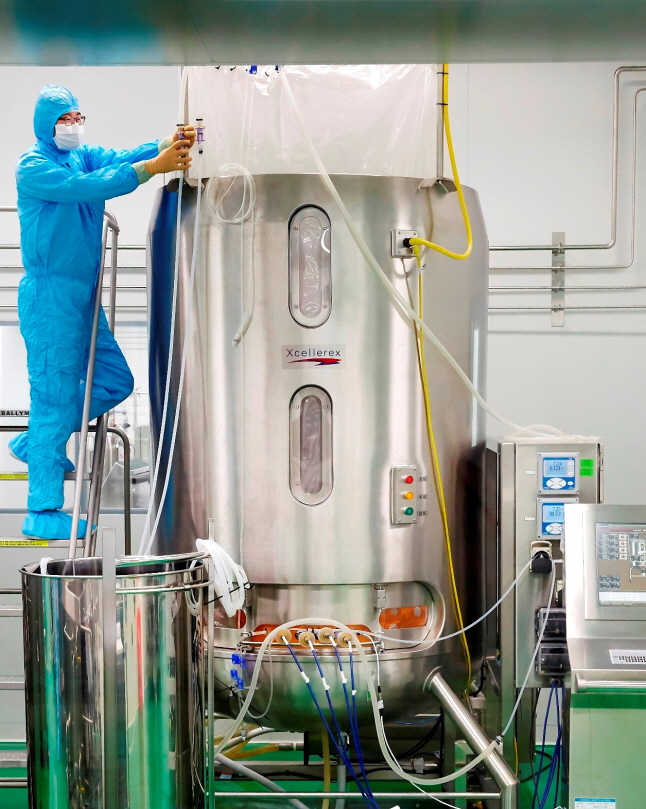● SK chemicals, Sanofi Pasteur Enter Cell-Culture Technology Licensing Agreement
- Licensing agreement signed with Sanofi Pasteur, a global vaccine company
- Global expansion of world's first commercially-available quadrivalent cell-culture flu vaccine
production technology
- Contract valued at $155 million with additional royalties for sales of commercialized products
With the export of its vaccine production technology to a global pharmaceutical company, SK chemicals has once again gained recognition for its world-class expertise.
The company announced on the 12th of this month that a licensing agreement had been signed to apply its proprietary cell-culture vaccine technology to a yet-to-be-announced universal influenza vaccine being developed by Sanofi Pasteur, a global leader in vaccines.
A universal influenza vaccine is a next-generation flu vaccine that is effective against a variety of mutant viruses through the targeting of a common base sequence that exists among viruses.
As the vaccines division of the multi-national pharmaceutical company Sanofi S.A. and having more than 110 years of history, Sanofi Pasteur has developed vaccines to prevent over 20 infectious diseases and supplies them to more than 500 million people worldwide annually. The company is the largest manufacturer and supplier of flu vaccines in the world.
The technology transfer and licensing agreement between SK chemicals and Sanofi Pasteur's is valued at a maximum of $155 million USD (approx. \169.1 billion KRW), which is estimated to be the largest amount ever for a domestic company exporting vaccine technology.
SK chemicals will receive the total of $155 million in stages based on performance milestones. $15 million is set to be received with the signing of the technology export contract, with another $20 million after the actual technology transfer. A maximum of an additional $120 million is set to be received according to each milestone. Furthermore, a certain percentage of royalties is to be received based on sales of commercialized products.
The cell-culture flu vaccine technology to be exported uses animal cells, unlike conventional egg-based methods, for a fast and efficient production process.
Using this technology, SK chemicals launched their trivalent cell-culture flu vaccine in 2015 and succeeded in commercializing the world's first quadrivalent cell-culture flu vaccine in 2016. SK chemicals' cell-culture flu vaccine SKYCellflu exceeded cumulative sales volume of 14 million doses within three years of its launch.
"We're pleased to license this innovative technology today, as it brings us a step forward in the development of a future broadly-protective influenza vaccine, a key priority for Sanofi Pasteur," said David Loew, CEO of Sanofi Pasteur.
SK chemicals’ President Man-hun Park stated, "This is the result of our strategic focus on the development of premium vaccines based on innovative technologies." He added, "This is validation of domestic vaccine technology being at a global level."
Prior to the signing of this agreement, SK chemicals had been jointly developing a next-generation pneumococcal vaccine with Sanofi Pasteur since 2014. What's more, the company is currently developing a typhoid vaccine with an international vaccine laboratory under R&D support of the Bill & Melinda Gates Foundation and is also involved in the development of a new rotavirus vaccine with Program for Appropriate Technology in Health (PATH), an international, non-profit global health organization.
Since 2008, SK chemicals has invested a total of \400 billion toward the development of vaccines. The company's world-class L-House vaccine plant in Andong, North Gyeongsang Province is home to base technologies and production facilities for cell-culture, bacterial-culture, gene-recombinant, and protein-conjugate vaccines to be developed within South Korea.
SK chemicals plans to establish its position in the domestic market with various premium vaccines produced at L-House, continue to bid for international contracts through WHO prequalification (PQ) certification, and export technologies as a global company.

An SK chemicals employee is using a cell-culture tank to produce flu vaccine.